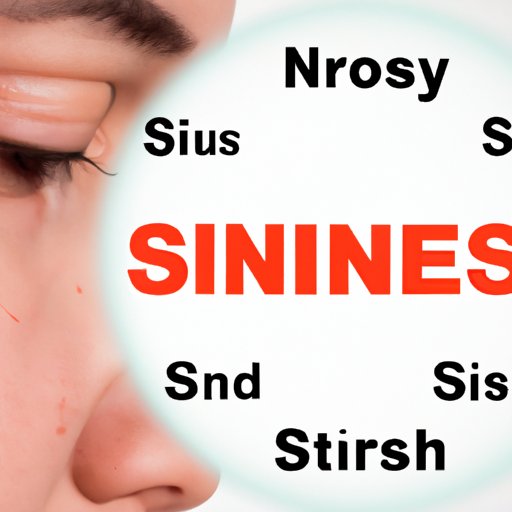
Introduction
If you’re experiencing a stuffy nose, facial pain, or pressure, you may be having a sinus infection. Sinusitis, as it’s medically known, is a common condition that affects millions of people worldwide. It occurs when the sinuses, which are hollow cavities located in the skull, become inflamed and swollen, leading to a range of unpleasant symptoms. Identifying the symptoms of sinus infection is crucial in ensuring timely treatment and faster recovery.
Symptoms to Watch For
The common signs of sinus infection include:
- Congestion: Nasal congestion is a common symptom of sinusitis. It happens when the sinuses are blocked, either due to inflammation or mucus buildup. There are two types of congestion – anterior and posterior.
- Headaches: A headache is another symptom of sinusitis. However, it’s crucial to distinguish between a sinus headache and other types of headaches like migraines.
- Facial pressure and pain: The pain and pressure from sinusitis are usually felt in the forehead, cheeks, and eyes. The intensity of the pain and pressure can vary from mild to severe.
- Fatigue: Fatigue is a common symptom of sinusitis and is often due to poor sleep quality and the body’s immune response to the infection.
- Other symptoms: Other symptoms of sinusitis may include a sore throat, cough, earache, and postnasal drip.
What Causes a Sinus Infection
The most common causes of sinusitis include:
- Bacteria: Bacterial infections are a common cause of sinusitis. The most common pathogens include Streptococcus pneumoniae, Haemophilus influenzae, and Moraxella catarrhalis.
- Viruses: Viruses can also cause sinusitis, especially during the cold and flu season. The most common culprits include rhinoviruses, adenoviruses, and influenza viruses.
- Environmental triggers: Allergies and irritants like pollen, dust, and air pollution can trigger sinus problems in susceptible individuals.
- Structural abnormalities: Deviated septum and other structural abnormalities of the sinuses can also lead to inflammation and blockage of the sinuses.
When to See a Doctor
You should see a doctor if you experience:
- Signs of bacterial infection: If your symptoms persist for over ten days, you may have a bacterial infection that requires antibiotics.
- Prolonged symptoms: Symptoms lasting for over four weeks may require medical intervention.
- Severe symptoms: If the pain and discomfort become unbearable, seeking medical attention is essential.
- Risk factors: Individuals with a weakened immune system, asthma, allergies, or nasal polyps are at higher risk of developing sinusitis and should seek immediate medical attention if they experience symptoms.
Home Remedies for Sinus Infections
Here are some home remedies to alleviate sinusitis:
- Saline rinses: Saline rinses like Neti pots can help relieve nasal congestion by flushing out mucus and allergens.
- Steam inhalation: Steam inhalation can help reduce inflammation and ease congestion. Types of steam therapy include hot showers, facial steams, and humidifiers.
- Essential oils: Essential oils like peppermint or eucalyptus can help relieve sinusitis symptoms, but caution should be taken when using them topically or orally.
- Nasal irrigation: Nasal irrigation is a technique that uses a saline solution to flush out mucus and allergens from the nasal passages.
- Rest and hydration: Adequate rest, hydration, and a healthy diet can improve your immune system and speed up recovery.
Preventing Sinus Infections
Here are some tips to prevent sinusitis:
- Good hygiene: Practice good hygiene by washing your hands regularly and avoiding close contact with people who have colds or flu.
- Allergy management: Avoid allergens that trigger your symptoms, and take appropriate medication as prescribed by your doctor.
- Lifestyle changes: A healthy lifestyle that includes regular exercise, stress management, and a balanced diet can help boost your immune system and prevent sinusitis.
Types of Sinus Infections
Sinusitis can be classified into three types:
- Acute sinusitis: Acute sinusitis lasts up to four weeks and is usually caused by viral infections.
- Subacute sinusitis: Subacute sinusitis can last up to 12 weeks and is caused by bacterial infections.
- Chronic sinusitis: Chronic sinusitis lasts for over 12 weeks and can be caused by allergies, environmental irritants, or fungal infections.
Treating Sinus Infections
Medical treatment for sinusitis may include:
- Antibiotics: Antibiotics may be prescribed for bacterial infections.
- Decongestants: Decongestants can help alleviate congestion and swelling.
- Corticosteroids: Corticosteroids can help relieve inflammation and reduce swelling.
- Surgical options: Surgery may be required in cases of chronic sinusitis or structural abnormalities.
Conclusion
Sinus infections can disrupt your daily life, but identifying the symptoms, causes, and treatment options can help manage the condition effectively. You can prevent sinusitis by practicing good hygiene, avoiding allergens, and leading a healthy lifestyle. Medical treatment, when needed, can help alleviate symptoms and promote faster recovery.




